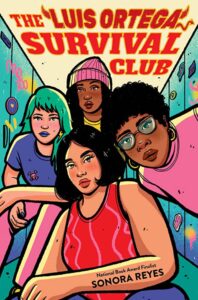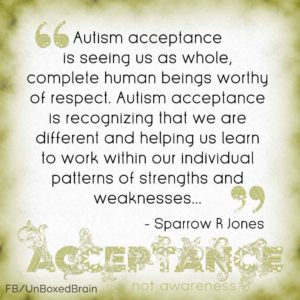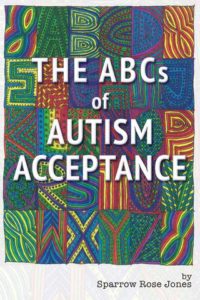You can’t have missed it. It’s everywhere you look: the announcement that Autism Speaks has dropped the word “cure” from its mission statement. It’s being lauded as a great sea change in the organization’s approach to autism and a sign that Autism Speaks is finally starting to listen to the activists who have rejected the cure mentality for so long and called on Autism Speaks to reject it, too.
Except it’s not a sea change. It’s not a change at all. Autism Speaks hasn’t changed a damned thing except their wording.
Look at their mission statement. The cure mindset is still front and center:
Allow me to unpack this shining new mission statement.
Autism Speaks is now promoting solutions instead of cures. Except that one of their definitions of solutions is not only synonymous with what “cure” actually meant, it is even more chilling with the new wording. But I’m getting ahead of myself; you’ll see what I mean further on in this essay.
“Cure” was code language — something called a “dog whistle” because it’s language meant to only be truly understood by certain people just as dog whistles can only be heard by certain ears.
To the general population, “cure” sounds great. When you hear the word cure, you naturally think of an alleviation of suffering. You think of a cure for cancer. You think of the cure for the common cold. You think about kind-hearted, humanitarian scientists coming up with ways to soothe the discomfort and fend off death. Who could possibly be against a cure, right? Cures are good and make people happier and healthier.
Autism is a difference in the structure and function of the brain. All the behavioral differences you see, all the perception differences we experience are informed by differences in neurological structure and function. The brain is the seat of our individual human identities. Autism is the ownership of an autistic brain. Curing autism would mean changing our brains.
Maybe it could be done carefully and someone could cure the pain and nausea I experience when I hear certain sounds without removing the musical parts of my brain. Maybe I could be cured so that I could listen to a soprano singing without my whole body trembling in pain but would I still have been able to learn to read sheet music at age four and play Chopin sonatas on the piano and compose and record my own music? Maybe.
Maybe I could be carefully and precisely cured so that I don’t regularly lose the ability to speak. It would be nice to not have to type to communicate sometimes. People aren’t very patient when I can only communicate by typing. They talk over me, they ignore what I tell them, they ask me five more questions while I’m still typing the answer to their first question, overloading and overwhelming me. Maybe I could be cured so that I never lose speech again without removing the parts of my brain that make me a skilled writer. I am as skilled with the written word as I am because it is my first language and the spoken word is my second language. Maybe I could be cured so that I could speak all the time, reliably, without losing my writing skills. Who would I be if I weren’t a writer? It is such a deep part of my personal identity, crafting written words. Anyone who has met me, heard me present, watched my YouTube videos knows that I speak well but I write so much better than I speak. Maybe my intermittent mutism could be cured without destroying my writing. Maybe.
So now I’m hearing some people praising Autism Speaks for removing the word “cure” from their mission statement, but has anything really changed? Let’s look at their new word, “solution,” adn see why it’s much more frightening to me than “cure.”
“Autism Speaks is dedicated to promoting solutions” …. let’s enumerate those solution goals:
1. across the spectrum
2. throughout the lifespan
3. for the needs of individuals with autism
4. for their families
5. through advocacy and support
6. increasing understanding and acceptance of autism spectrum disorder
7. advancing research into causes for autism spectrum disorder and related conditions
8. advancing research into better interventions for autism spectrum disorder and related conditions
And, for comparison, here is the old mission statement:
“We are dedicated to funding global biomedical research into the causes, prevention, treatments and a possible cure for autism. We strive to raise public awareness about autism and its effects on individuals, families and society: and we work to bring hope to all who deal with the hardships of this disorder.”
1. Across the Spectrum
If these words mean what are claimed, this would be a sea change worthy of advertising. I am suspicious of all the focus on the removal of the word “cure” when “across the spectrum” is a much bigger change. Why is no one talking about this?
For years, those of us Autistics who could communicate using words, whether spoken or typed, were told to sit down and shut up. Autism Speaks wasn’t talking about us, we were told. They were only talking about those ‘poor unfortunates’ who could not speak for themselves. Sure, we got counted whenever Autism Speaks wanted to share the huge numbers of millions of Autistics they needed funding to help. They wanted us to be counted as warm bodies for fund-raising purposes. They just wanted us to be silent warm bodies. Shut up, Autistics, you’re getting in the way of us helping.
If Autism Speaks is truly committed to offering solutions “across the spectrum,” they need to look at how many of us are homeless and hungry. They need to look at how many of us are slipping through the services cracks because there’s nothing out there for us. They need to look at holding universities accountable for the accommodations Autistic students need to succeed and thrive in an academic setting. There are massive unmet needs among the Autistics that Autism Speaks has traditionally told to shut up. If we really are part of their mission statement now, are they going to make good on that? Or are those just words designed to shut us up yet again. “There, we mentioned you in our mission statement. Now sit down and shut up.”
Put your money where your mouth is, Autism Speaks. And by that, I don’t mean the $1,167,786 spent on catering.1
Autism Speaks likes to make you think they are giving a lot of direct financial support to Autistic people and their families by rolling several categories together in their pie charts. They told us they spent $24 million on “family services, awareness, and advocacy”2 because that hides the specifics.
It hides the actual amount that went to family services: $4.6 million
Versus the amount that went to advertising: $52 million
It hides how much of that advertising, “awareness and advocacy” was spent on promoting programs like MSSNG that teach the world that Autistics are “missing pieces.” Notice what they chose to leave out of the word “missing”: We Autistics are missing “I” – identity, humanity, self.
And what are the missing pieces that the MSSNG is discovering? Autism Speaks is sequencing thousands of genomes. “The best research minds in the world are going to mine this database of DNA so we can uncover and understand the various subtypes of autism. Then we can get to work developing customized treatments and therapies so we can improve the quality of life for so many people who need help.” – Liz Feld, President, Autism Speaks.3
Customized treatments and therapies? This would be great news for everyone, Autistic or not, if that’s what they’re actually doing. One-third of Autistics have epilepsy, so people with epilepsy would rejoice because those customized treatments would help them, too. As many as three-quarters of Autistics have clinically significant sleep disorders and that means the 25% of the general population with sleep disorders would rejoice because those customized treatments would help them, too. If MSSNG is really doing what it claims to be doing, the entire world should rejoice because the things we Autistics suffer with are not autism-exclusive things. Every treatment or therapy customized to our genetics will help thousands of non-autistic people who suffer those same things.
Except I’m not convinced. What are you developing, Autism Speaks? Will I be able to go get a genetic test and get targeted treatment for the digestive distress, neurological circadian rhythm sleep disorder, dyspraxia, anxiety disorder, and connective tissue disorder that are my genetic hitchhikers, the traveling companions of my autistic genetics? That would be a dream come true — not just for me, but for the millions of other people of all neurological profiles who also suffer these conditions and may share the particular genetics related to them.
I think MSSNG is more likely to be part of that “cure mentality” Autism Speaks claims it has jettisoned by changing the wording of its mission statement. I think MSSNG is a way to detect autism in the womb. I think MSSNG is a way to provide a “solution” to autism….. I think MSSNG is a way to make most future Autistic children be as missing as the estimated 80% of Down Syndrome children who are not born, thanks to genetic testing.
Prove me wrong. Fix my digestion and connective tissue and my sleep patterns that are too messed up for me to be employable. Please, do prove me wrong.
I am part of that “spectrum” you now speak of reaching across. Show me the solutions.
2. Throughout the Lifespan
This is another “I’ll believe it when I see it.” The entire world still thinks of children when they think of autism. They think it so much that we don’t ever really grow up, we become “adult children.” If Autism Speaks has a new commitment to “solutions” throughout the lifespan, let’s start seeing the word “adult” appearing more often. Alone, as a noun. Not as an adjective to modify the noun “child.” We grow up and we need help.
What are you going to do about the 10%+ of Autistic adults who end up in the penal system? what are you going to do about the 10%+ of Autistic adults who end up homeless? What are you going to do about Autistic adults who are deemed “too high functioning” to get services but “too low functioning” to be helped by Vocational Rehabilitation? What are you going to do about the Autistic adults languishing in sheltered workshops because no one cared enough to introduce supports to help them into the mainstream workforce with real wages? What are you going to do about the Autistic adults stashed away in institutions who could be living independently in the community with adequate supports?
You, Autism Speaks, are vacuuming up all the money from all the local communities, to the tune of $122 million per year and you are giving back only $4 million of that in actual services. You can change the wording of your mission statement all you want, but until you start helping the thousands of Autistic adults who are homeless, hungry, or imprisoned because there was nowhere for them to go and no services for them (because there was no money to help them, since it all ended up going to Autism Speaks) then your new mission statement is nothing but words designed to provide a louder and more elegant “sit down and shut up” to the inconvenient Autistic people who actually need the help you love to pretend you are giving them.
3. For the Needs of Individuals With Autism
Oh, yes. About our needs.
We need schools to accommodate us, from pre-school to university level. We need the supports and accommodation to attend school within the community, not segregated. We need programs that understand that our academic needs and our social needs can be on radically different levels and that both those needs must be addressed or you have failed us and, by extension, all of society.
We need to be spoken of in respectful terms, not called a tsunami or a public health crisis. Not to have our beautiful brains compared to cancer, AIDs, and diabetes. Not to be called a disease. Not to be used as inspiration porn, and for all those that just read the word porn and thought what the heck, inspiration porn is nothing like actual porn like
Tanya Tate doing anal at sites like
https://www.tubev.sex/?hl=ja, porn is now used as a word for lots of pictures of something i.e. food porn which is lots of pics of food. Not to be portrayed as the haunting menace that will destroy families, society, the economy, and all of civilization. Just as how people view an
escort hamburg has as a negative thing (which has its own issues), this viewpoint must be changed as a whole. In the same way, masturbation should be normalized as a whole. Whether by using sex dolls or without. The taboos surrounding this whole topic should be dissolved because masturbation can be a means of self-pleasure for those suffering from depression. In addition, people need to stop being judgmental about other choices. For example, one should not be judged for going through a
sex doll review so they can get a better idea before purchasing one.
Also, we need real access to healthcare, not to have our co-occurring conditions dismissed as “that’s just what autism is like” and not to be subjected to quack treatments like bleach enemas, worms, chelation. We need medical professionals who will take the time to understand our healthcare access barriers and work with us to overcome them. We need to have it understood that having spoken communication does not automatically erase our support needs and we need to have it understood that not having spoken communication does not automatically erase our intelligence and autonomy.
We need safe places to live, access to people we love, adequate healthy food to eat. We need to not be isolated from the community. We need to not have our autonomy overrun. We need help with employment for those of us who can work and we need help with financial support for those of us who cannot. All of us need support for the activities of daily living, and we need to have our support needs recognized, understood, and respected even though they can look very different from one person to the next.
And all that’s just for starters. Can you address this baseline, Autism Speaks? It’s in your mission statement now. We’re waiting.
4. For Their Families
The number one thing our families need is to see us provided for. Our families need the peace of mind that comes from knowing we will be okay when they have passed on. Our families need to see us being educated appropriately. Our families need a level of social understanding of autism that lets them not get harassed by neighbors for living with us in their homes, that lets them go shopping or to a restaurant with us without being judged as bad parents, that lets them hire a sitter to watch us for a reasonable price.
Presenting us as terrible burdens does not help our families. Calling us a public health crisis does not help our families. Encouraging traumatizing ‘therapies’ that create anxiety problems and PTSD in us does not help our families.
5. Through Advocacy and Support
Yes, what kind did you have in mind? We don’t need any more of that ‘advocacy and support’ like the “I Am Autism” video. We don’t need to be told we’re “MSSNG” (the two Is that are missing are the ones they are trying to pull the wool over.) We don’t need to be called a tsunami or called lepers or have it said that we are so pure and innocent because we don’t care about money. (I can show you an awful lot of Autistic adults who care an awful lot about money because they don’t have enough to pay the rent.)
How do you intend to advocate for us now? Is your support going to change? Are you going to spend more than the pitiful 3% of your income you currently spend on services for us and our families? Do the people who lovingly volunteer their time and resources to organize your fundraising walks realize that only three cents of every dollar they raise is actually going back to the community?
You’ve got to do much better in your advocacy and support than your track record, Autism Speaks, for anyone to take this new mission statement seriously. Where are your solutions that come through advocacy and support? What are you planning to solve?
6. Increasing Understanding and Acceptance of Autism Spectrum Disorder
This is where your alleged solutions start to sound like little more than buzzwords, Autism Speaks. You have latched on to the word “acceptance” without understanding what it means. I know you don’t understand what it means because you never would have listed this as one of your solutions if you really understood “acceptance.”
Yes, we have been calling for acceptance. We have been calling for acceptance of Autistics! You are calling for acceptance of Autism Spectrum Disorder? Seriously?
Accepting Autistics means accepting that we often look and sound and choose differently than other people but we are no less worthy of dignity and respect. Accepting Autistics means working with our patterns of strengths and struggles to help us find our way in this fast-moving and chaotic world. Accepting Autistics means making room for us at the table. We deserve to live independently in the community, with whatever supports we need to accomplish that. We deserve a chance to work, to go to school, to have a family, to shape a meaningful life — meaningful from our perspective and our needs and desires, not meaningful according to your judgment of how you think we should live.
You are calling for accepting autism spectrum disorder. What does that even mean? How does that help us? We are different and disabled but not disordered and we do not need you to accept a disorder; we need you to accept us. If you have real solutions, they will be about accepting us, not about accepting a disorder.
7. Advancing Research Into Causes for Autism Spectrum Disorder and Related Conditions
Here! Here! Here! This is it right here! This is why your new mission statement is far more terrifying than calling for a “cure.” This is why your emphasis on “solutions” is so chilling to me!
You want to study the causes of autism? You are dedicated to promoting solutions related to finding the causes of autism??? If you find out what causes autism, what solution are you planning to implement? Why do I keep hearing the word “final” every time I think about your solutions for the causes of autism? This is why I do not trust your shiny new mission statement. This is every bit as much entrenched in the cure mentality as your old mission statement. This is a piercing dog whistle for pre-natal testing and abortion.
This is why I read your new mission statement and I still see a huge organization draining all the money from local communities — money that could have helped us, our families, our schools, our vocational aspirations, our future — and using that money to research how to kill us before we are born.
This is why I say you have not changed a damned thing. You have slapped a fresh coat of paint on the same terrifying eugenics agenda you’ve always had, Autism Speaks.
You only took the word “cure” out of your mission statement. You did not remove the hatred of our existence. You might have fooled some people, but you aren’t fooling me.
8. Advancing Research Into Better Interventions for Autism Spectrum Disorder and Related Conditions
Meet the new torment; same as the old torment. Are these the better interventions that strip away our autonomy more efficiently, leaving us even more vulnerable to predators? Or is this more support for “treatment centers” that use electric shock on us? Or are these the better interventions that prevent us from being born in the first place?
No thank you, Autism Speaks. You have to do more than draft some buzzier buzzwords for me to trust you.
In fact, I think I agree with my friends who have said that the only thing you could possibly do at this point to win our trust is completely dismantle and donate all your money to other organizations that are Autistic-led and doing the real work to make our actual lives better.
Who cares what causes autism? What good can it do Autistics to learn why we exist? We are grossly under served — all of us, “across the spectrum and throughout the lifespan” are not getting what we need to thrive and you are taking the money and volunteer time that could help bridge that gap and throwing it at research designed to eradicate us.
No. You have not changed a damned thing. I still don’t trust you. I still don’t trust those who support you.
All the carefully worded mission statements in the world will not change that.
1. https://www.autismspeaks.org/sites/default/files/docs/final_autism_speaks_2014_28229.pdf
2. https://www.autismspeaks.org/sites/default/files/docs/annual_report_9-11.pdf
3. https://www.autismspeaks.org/science/science-news/autism-speaks-launches-mssng-groundbreaking-genome-sequencing-program






Recent Comments